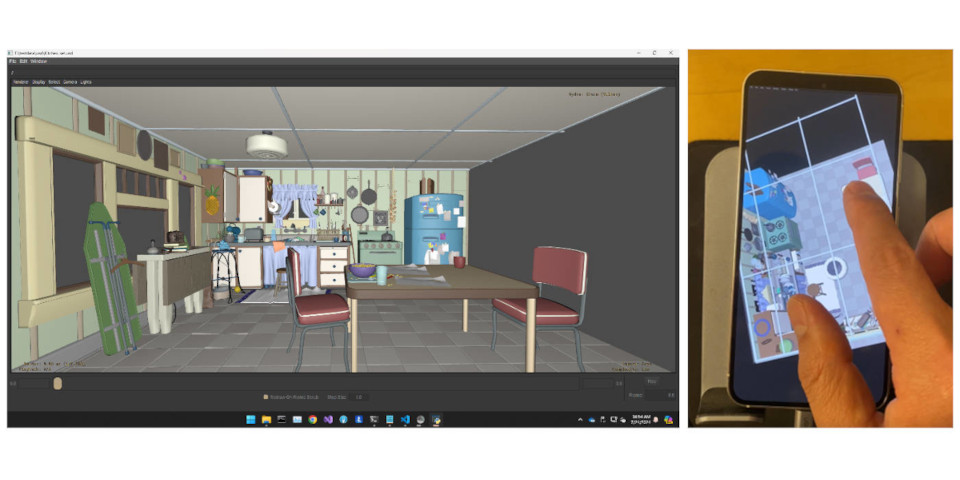OpenUSD now supports Vulkan

Pixar’s standard Kitchen Set scene rendering inside the default OpenUSD HdStorm renderer on Windows (left) and Android (right) using the OpenUSD Vulkan backend.
Universal Scene Description now officially supports the Vulkan graphics API, including in its Hydra rendering framework and default HdStorm renderer.
The experimental HgiVulkan backend is intended to provide a higher-performing alternative to OpenGL on Windows and Linux, and to enable developers to support Android devices.
OpenUSD: the backbone of many current VFX and games pipelines
Developed in-house at Pixar, and open-sourced in 2016, the Universal Scene Description has become a key part of VFX, animation and game development pipelines.
The framework and its USD file format, which enables high-level scene data to be exchanged between software tools, is now supported by nearly every major DCC application.
Development of USD – officially renamed OpenUSD last year – is now overseen by cross-industry body the Alliance for OpenUSD (AOUSD).
Vulkan now supported via Hydra’s HgiVulkan backend
Originally, HdStorm, the default renderer in OpenUSD’s Hydra rendering framework, only supported the ageing OpenGL API for GPU computing, including GPU rendering.
To expand support to newer APIs, later updates introduced an abstraction layer, the Hydra Graphics Interface (Hgi).
Hgi is already used in the HgiMetal backend to support Apple’s Metal API on macOS and iOS, and is now being used in the HgiVulkan backend to support Vulkan, OpenGl’s successor, on Windows and Linux.
HgiVulkan has been an experimental feature for some time – it’s mentioned in the changelog as far back as 2021 – but has now been announced officially by Khronos Group, which oversees the Vulkan standard.
OpenUSD 24.08, the latest version of OpenUSD, also includes several key improvements to HgiVulkan, including support for material and lookdev data standard MaterialX.
Intended to make Vulkan a ‘more compelling alternative’ for developers
According to Khronos Group’s blog post, the work is part of a collaborative effort between AOUSD members Pixar, Autodesk and Adobe to bring HgiVulkan to feature parity with the existing OpenGL and Metal backends.
The firms ultimately aim to achieve improved performance over the OpenGL backend, making Vulkan a “more compelling option for developers” on Windows and Linux.
Vulkan is not yet widely supported in DCC apps, despite notable exceptions like Houdini, where the new Vulkan viewport officially replaced the old OpenGL viewport in Houdini 20.5 this year.
Vulkan support in OpenUSD also extends to Android, making it possible for developers to “create high-performance 3D applications for a wider range of devices”.
Still some known limitations
Support for Vulkan within OpenUSD is still officially experimental, and according to the blog post, there are still “known limitations and performance issues that are being addressed”.
In particular, unit testing is not yet available on Windows, although the “majority” of existing imaging unit tests in OpenUSD pass when run with the HgiVulkan backend on Linux.
License and system requirements
Source code for OpenUSD is available under a modified version of the Apache 2.0 license, now known as the Tomorrow Open Source Technology (TOST) license.
It can be compiled on Linux, Windows and macOS.
Read more about Vulkan support in OpenUSD on the Khronos Group blog
Have your say on this story by following CG Channel on Facebook, Instagram and X (formerly Twitter). As well as being able to comment on stories, followers of our social media accounts can see videos we don’t post on the site itself, including making-ofs for the latest VFX movies, animations, games cinematics and motion graphics projects.
